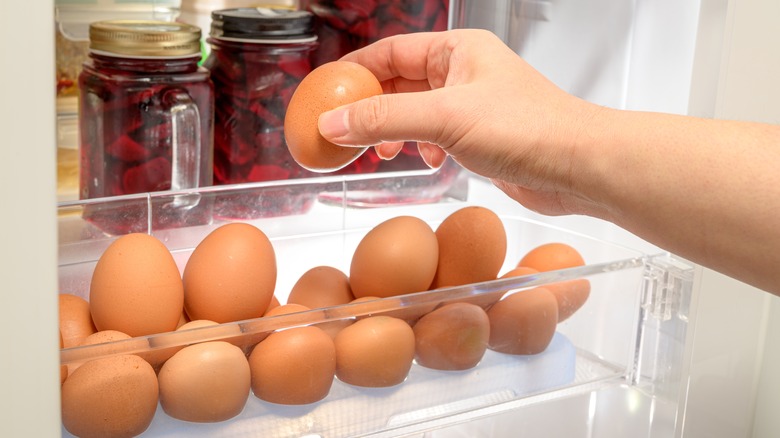The Serious Reason To Refrigerate Eggs As Soon As You're Back From The Store
Here in the U.S., refrigerating eggs is essential for safe consumption. Maybe you've heard about how in Europe, eggs can be left out on the counter for up to two weeks without going bad, per Insider, and wondered if you can do the same in the States. But unlike in other parts of the world, as explained by Healthline, American eggs are washed and sanitized. This is meant to get rid of any dirt on the shells, but it also removes the eggs' natural cuticles, which help keep bacteria out.
According to the U.S. Department of Agriculture (USDA), eggs need to be refrigerated as soon as you get home from the store. Why? Without that cuticle protection, they're more susceptible to salmonella – and as the USDA explains, "temperature fluctuation is critical to safety" when dealing with eggs. If you keep your carton out for over two hours, you increase your risk of salmonella symptoms, which include diarrhea, fever, and stomach cramps, according to the Centers for Disease Control and Prevention (CDC).
When your eggs are in transit home from the grocery store, they've already spent some time out in the open — so it's crucial to get them in the fridge right away.
Bacteria can grow quickly on room temperature eggs
Salmonella is a serious concern in the United States, considering there are about 1.35 million infections here every year, according to the CDC. To stay on the safe side, we know to refrigerate our eggs as soon as we get home from the store — but it's also important to make sure they stay cold once they're refrigerated. If you take your carton out, let it warm up a little, and then crack a few eggs into a frying pan, the USDA says that they "can sweat, facilitating the movement of bacteria into the egg and increasing the growth of bacteria."
For this reason, the U.S. Department of Commerce requires egg producers to keep their cartons at 45 degrees Fahrenheit or below when transporting them to stores. When you're grocery shopping, make sure you only buy eggs that are stored in refrigeration with the doors closed and are in sealed cartons with uncracked shells. And when you get home, it may be worth double-checking that your fridge is set to a temperature of 40 degrees Fahrenheit or below.
These steps are minimal, but they can have big impacts if neglected — and when it comes to your health, it's never worth the risk.

